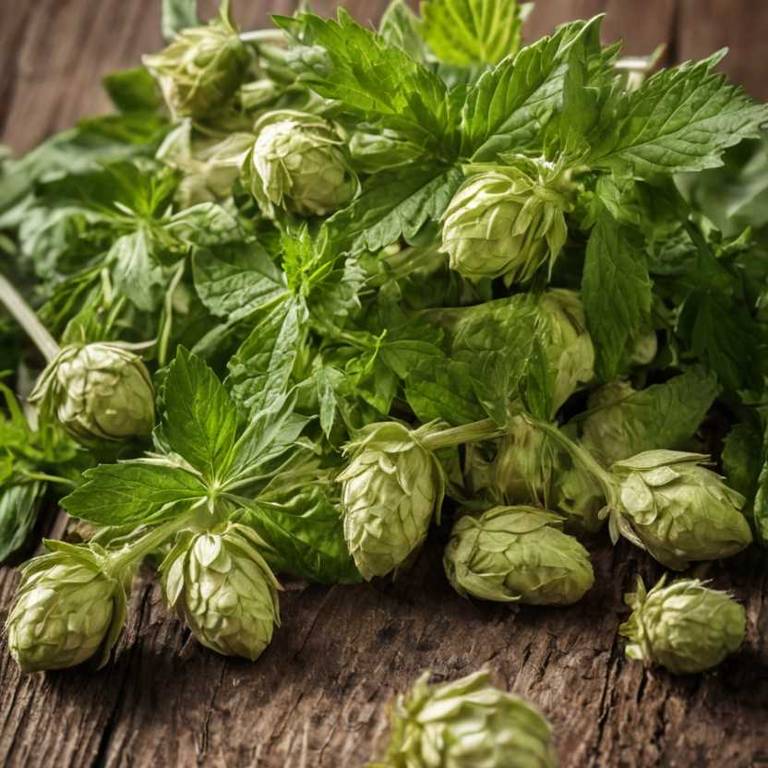By Leen Randell
Updated: Jul 05, 2024
What Are The Medicinal Properties Of Humulus Lupulus (Hops)?

Humulus lupulus, also known as hops, has health benefits such as reducing anxiety and improving sleep quality.
The medicinal constituents of hops include flavonoids, tannins, and essential oils, which contribute to its therapeutic properties. Hops can be found in various medicinal preparations, including teas, infusions, and capsules, often used to alleviate symptoms of insomnia and restlessness. Side effects of hops may include drowsiness, dizziness, and allergic reactions in some individuals.
Precautions when using hops include consulting a healthcare professional, especially for pregnant or breastfeeding women, and individuals with underlying medical conditions.
This article explains the health benefits, active constituents, medicinal preparations, possible side effects, and precautions related to Humulus lupulus.
What are the health benefits of Humulus lupulus?
Humulus lupulus, also known as hops, has health benefits such as anti-inflammatory properties, which can help reduce swelling and pain.
Its sedative and anxiolytic effects may also promote relaxation and improve sleep quality. Additionally, hops contain antioxidants that can protect against cell damage and oxidative stress, potentially reducing the risk of chronic diseases like cancer and neurodegenerative disorders.
Its therapeutic applications are still being researched and explored.
Here's a detailed article about the 10 health benefits of Humulus lupulus.
What are the active constituents of Humulus lupulus?
Humulus lupulus, also known as hops, has active constituents such as flavonoids, phenolic acids, and essential oils that contribute to its medicinal properties.
The most significant constituents include alpha-bisabolol, beta-acid, and alpha-acid, which have been shown to possess anti-inflammatory, antimicrobial, and antioxidant effects.
Additionally, hops contain humulone and lupulone, which are known for their sedative and anxiolytic properties.
Here's a detailed article about the 10 active constituents of Humulus lupulus.
What are the medicinal preparations of Humulus lupulus?
Humulus lupulus, also known as hops, has medicinal preparations such as infusions, decoctions, and tinctures.
The flowers and cones of the plant are commonly used to make these preparations, which are valued for their anti-inflammatory, antiseptic, and sedative properties.
In traditional medicine, hops are used to treat anxiety, insomnia, and restlessness, as well as to soothe digestive issues and menstrual cramps.
Here's a detailed article about the 10 medicinal preparations of Humulus lupulus.
What are the possible side effect of using Humulus lupulus improperly?
Improper use of Humulus lupulus, also known as hops, increases the chances of experiencing side effects such as dizziness, nausea, and stomach discomfort.
High doses can lead to headaches, anxiety, and insomnia, while interactions with certain medications may amplify these effects. Additionally, hops may worsen sleep apnea and exacerbate underlying liver conditions.
Moderation is key to minimizing these risks when using hops for its medicinal properties.
Here's a detailed article about the 10 most common side effects of Humulus lupulus.
What precautions to take when using Humulus lupulus medicinally?
Before using Humulus lupulus, also known as hops, for medicinal purposes, you must take precautions such as consulting with a healthcare professional, especially if you're pregnant or breastfeeding.
Hops can also interact with certain medications, including sedatives, antidepressants, and blood thinners. Additionally, excessive consumption can lead to adverse effects like dizziness, nausea, and allergic reactions.
Proper dosage and preparation are essential to minimize risks and maximize benefits.
Here's a detailed article about 10 precautions to take when using Humulus lupulus.